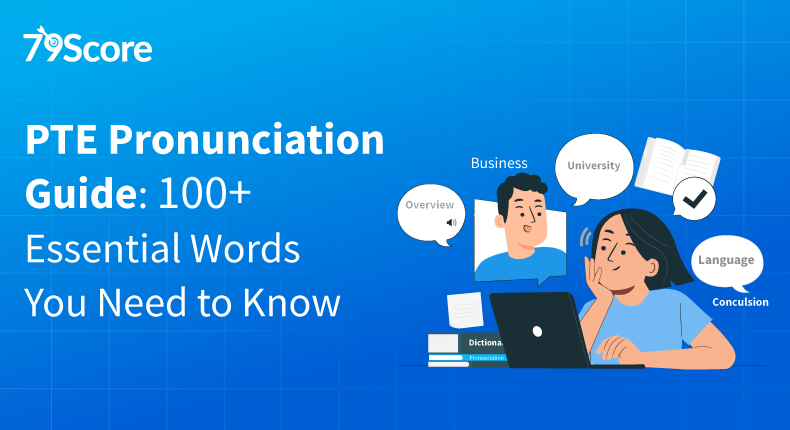Scoring 79+ in the PTE is not about being “excellent in English.” Many native speakers struggle to score full marks because the test is built around technique, structure, and system awareness, not just language. If you understand how the exam listens to you, reads your answers, and scores your performance, 79+ becomes realistic. So here are tips to score 79+ in PTE.
1. Understand the format and scoring:
The PTE uses automated scoring. It doesn’t “feel” your tone, personality, or emotion. Instead, it reads:
- clarity,
- fluency,
- intonation,
- grammar,
- vocabulary use,
- and accuracy.
This means your job is not to impress but to be consistent and easy to understand. Once you stop trying to sound “perfect” and start aiming for clarity and structure, your overall score jumps significantly.
2. Build Real Fluency:
Fluency is one of the most important scoring areas across all PTE exams. Fluency doesn’t mean speaking fast or using fancy words. It simply means:
- You don’t hesitate,
- You don’t repeat yourself,
- Your speech flows naturally,
- Your sentences feel connected, not broken.
You can have minor errors in grammar or pronunciation and still score very high as long as the flow remains natural.
How to build real fluency:
- Record yourself daily for a few minutes.
- Speak slowly but steadily; avoid sudden pauses.
- Practice explaining simple topics in clear sentences.
3. Strengthen Your Listening Memory
A large portion of the PTE Core or Academic tests how well you comprehend information. Whether it’s an audio clip, a question prompt, or an instruction, sharper listening memory makes everything easier.
Practical ways to improve this:
- Listen to short podcasts and summarize them in one or two lines.
- Play a 5–10 second audio clip and repeat it without notes.
- Train yourself to capture keywords, not every detail.
Good listening memory directly improves your speaking fluency, listening accuracy, and even reading comprehension.
4. Have a Strong Grip on Grammar
You don’t need to use complex vocabulary to score 79+. Correct and simple grammar will also help you reach their. Grammar is an important scoring criteria of many high-weight tasks.
Focus on:
- clear subject–verb agreement,
- consistent tenses,
- avoiding run-on sentences,
- and using connectors naturally.
If your grammar is stable, your writing and speaking scores rise across the board because PTE rewards accuracy.
5. Build a Functional Vocabulary
High scorers don’t use difficult words; they use the right words. PTE is about using language naturally, not academically. A functional vocabulary helps in every part of the test—reading comprehension, speaking clarity, writing structure, and listening interpretation.
Functional vocabulary means:
- common verb phrases (take place, carry out, look into),
- simple connectors (however, therefore, meanwhile),
- everyday nouns (impact, solution, challenge),
- basic adjectives (major, effective, essential).
6. Improve Your Pronunciation Through Clarity, Not Accent
The scoring engine doesn’t care about your accent. It only checks:
- whether your words are clearly separated,
- whether the stress pattern is understandable,
- and whether your tone sounds natural.
To improve pronunciation:
- Read aloud for 5 minutes every day.
- Emphasise important words, reduce fillers.
- Clarity > accent. Always.
7. Train Your Eyes with Faster Reading Habits
PTE requires you to read quickly and understand the meaning immediately. You’re not judged on speed, but as the exam is time-bound, you are judged on how efficiently you get the idea in a limited time.
Useful habits:
- Read for 10–15 minutes a day from reliable sources (news, reports, articles).
- While performing tasks, skim main ideas and scan for important details.
- Find out keywords instead of reading line by line.
- During exam, quick comprehension helps in responding accurately.
8. Strengthen Your Writing Structure
Whether you are writing a summary or any response, structure matters more than big vocabulary. An organized and structured response helps in enhancing the clarity of the respons,e which eventually helps in scoring high.
Stick to:
- Clear topic sentences,
- Short supporting points,
- Consistent punctuation,
- And balanced sentence length.
9. Practice in a Real Exam-Like Environment:
Most of the time, students become more anxious and panic while taking the real exam because they are not aware of the environment. And because of this, they lose focus and the fluency breaks. To avoid this:
- Take full-length PTE mock tests consistently
- Sit for 1.5–2 hours straight during practice without breaks.
- Train your brain to stay sharp from start to finish.
Practicing with real real-time exam simulation will make you habituated to the exam environment in advance, and you will not panic on test day.
10. Make a Practice Plan and Follow it Consistently:
Consistency beats intensity. Short, targeted practice sessions every day work far better than long, irregular sessions. Prepare a plan like:
- First, understand the exam format properly and check the high-weightage tasks across all the sections.
- Take a free mock test and understand where you are lacking.
- By evaluating your errors, practice more for weaker sections, which also carries high weightage.
- Take mock tests daily to check how much you are improving.
If you’re serious about securing a high band — especially if you’re aiming for a 79+ — these strategies can make a real difference in your performance. To put these tips to score 79+ in PTE into action, start practicing on 79Score. You’ll get access to a full-length PTE mock test along with individual section-wise tests, making it easier to focus on weaker areas. You can also use our free question-wise practice to build confidence and get familiar with the real exam format.
Also Read:
- Top 10 PTE Practice Test Websites to Boost Your Exam Score
- 5 Best Alternatives to AlfaPTE For PTE Preparation
|
79Score
|









